
We kindly inform you that, as long as the subject affiliation of our 300.000+ articles is in progress, you might get unsufficient or no results on your third level or second level search. In this case, please broaden your search criteria.




Democracy as political regime since Antiquity is based on a fundamental principle - the equality of free citizens. On the other hand this regime coexists with economic system of the market, which is based on competition and therefore produces inequality. This inevitably creates tension between democracy and the market, which are governed differently. Most research so far has not found strong impact of the democratic regime on social inequalities. But the issue is the opposite impact of inequalities on democracies. The article argues that deepening social inequalities unavoidably undermine democracy.
More...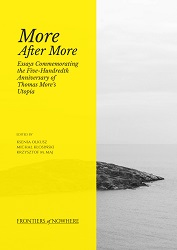


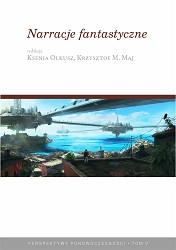
Rafał Szczerbakiewicz’s chapter looks at the intriguing aspects of the subtle utopianism of the main trends in classic Hollywood cinema. During the thirties, forties and fifties of the twentieth-century and at the peak of liberal modernity there was an omnipresent yet transparent capitalist paradigm. This was a time in cinema where the theme of utopia was obscure. Utopia, in cinema, was more a symptom of a frame of mind and the background to a social state of awarenesss. Within the supportive or critical portrayals of capitalism, the utopian/dystopian elements were notable signs as to the filmmaker’s attitude. Amongst films, the utopian impulse is merely an understatement. However, there is one film with an overt utopian stance. This film is based on the novel, "Fountainhead" (1949) by King Vidor. It was tranformed into a memorable screen adaptation by the enthusiast and theorist, Ayn Rand. In this surprising constructionist vision, the socio-architectural utopia is explicitly portrayed giving the utopian impulse the direction towards what would, years later, come to be known as individualistic neoliberalism.
More...
Periods of brinkmanship and crisis encourage the rise of apocalyptical thinking in modern society.The second half of the twentieth century witnessed the rapid development of post-apocalyptic fiction, whose authors examined the human condition in the face of extinction. The development of nuclear weapons and the subsequent dropping of the atom bomb on Hiroshima became of the inspiration of numerous comic book writers to exploit nuclear war anxieties of societies still reeling from the carnage of World War II. Furthermore, comic books became a forum for the presentation of social, political and philosophical discourses. The aim of Wojciech Lewandowski’s chapter is to present, accordingly, an exposition on comics, as media, are capable visionaries of complex philosophical discourses. Another vector is the graphic novel that presents a forum to communicate political ideas without being perceived as a propaganda tool. The presentation of political ideas occurs explicitly in the textual sphere. Furthermore, they can be presented in more sublte ways by the use of symbols that are presented in the visual layer. It is therefore, the capabilities of political discourse that have led me to research the graphic novel, "V for Vendetta". In "V for Vendetta", author’s Alan Moore and David Lloyd, write of a dystopian post-apocalyptic Great Britain. Through the fictional dystopian narrative of the plot one can discern its great potential as a forum of social and political discussion on the contemporary problems of the real-world.
More...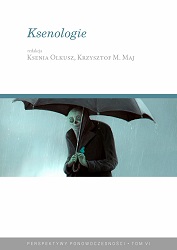

The article presents the technology for integration of refugees through projects run by unemployed Bulgarians with appropriate education, further education and the provision of employment. Shared significant European experience in organizing training and job placements for refugees, enabling to use any level of qualification of foreigners, and to ensure the security of the population.
More...
The freedom of association is not unfamiliar legal construction for the Bulgarian public life. It's foundations were established before the Liberation of Ottoman rule, and it's existence was inevitable mark of Bulgarian culture identity. Although the freedom of association wasn't incorporated in the Russian project of Bulgarian constitution, the father founders managed to validate it as a fundamental freedom. Thus until 1912 the latter showed it's potential and that was one positive aspect for the political and economical development of our state.
More...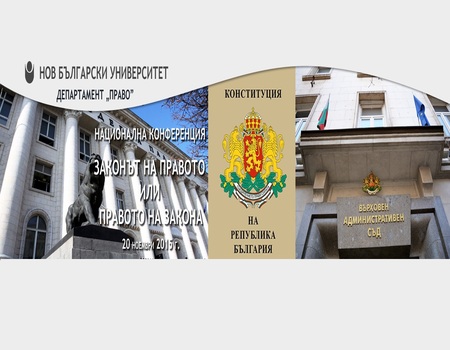
The principle of the rule of law is a fundamental element of the legal order of contemporary democracy. Even though it has been created on the basis of international treaties, the European Union is affirming as new type of organization of public authority, in whose legal system a series of manifestations of the rule of law find their expression. Through the case law of the Court of Justice of the European Union and through series of amendments of the Founding treaties, the principle of the rule of law turns into a state of constitutional character for the legal order of the EU, determining both the legality of the acts of the European institutions and the belonging of the member-states to the Union.
More...
Celem niniejszego artykułu jest prezentacja wyników analizy sytuacji gospodarczej w poszczególnych krajach UE-10 i ocena wpływu poziomu ich zadłużenia na wzrost gospodarczy. Analiza ta obejmuje swym zakresem cały okres ich członkostwa w Unii Europejskiej, tj. lata 2004–2013, uwzględniając zarówno lata wysokiego wzrostu sprzed kryzysu (lata 2004–2008), jak i okres zjawisk kryzysowych (lata 2009–2013). Hipotezę badawczą sformułowano następująco: nadmierny poziom zadłużenia w niektórych krajach wpływa negatywnie na osiągane tempo wzrostu produktu krajowego brutto (PKB). Konstrukcja artykułu została podporządkowana weryfikacji przyjętej hipotezy. W jego części pierwszej zaprezentowano krótki przegląd literatury dotyczącej związków między poziomem zadłużenia a wzrostem gospodarczym. W części drugiej przedstawiono sytuację gospodarczą w krajach UE-10 w okresie 2004–2014. Jest to jednocześnie niezbędny opis zmiennych wykorzystanych w badaniach empirycznych części trzeciej, w której z kolei za pomocą analizy korelacji oraz regresji panelowej wykazano zależności między poziomem zadłużenia i innymi podstawowymi wielkościami makroekonomicznymi a wzrostem gospodarczym. Artykuł kończą wnioski.
More...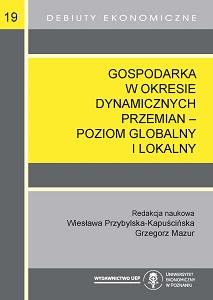
Celem niniejszego rozdziału jest próba wskazania scenariuszy rozwoju relacji handlowych Wielkiej Brytanii po opuszczeniu przez nią Unii Europejskiej oraz ocena możliwości ich realizacji. Kluczowym zadaniem dla Zjednoczonego Królestwa będzie zawarcie porozumienia z samą UE. Jeżeli zapadnie decyzja o opuszczeniu unii celnej, kraj ten stanie w obliczu dużego wyzwania, jakim będzie uregulowanie istotnych z punktu widzenia interesów państwa stosunków z niemalże całym światem. Poza kształtem przyszłych relacji z UE analizie zostały poddane różne projekty uregulowania stosunków handlowych z krajami trzecimi. W rekomendacjach dotyczących priorytetów polityki handlowej można wyróżnić kilka najczęściej wymienianych kierunków. Są to takie kraje, jak: Kanada, Australia, Indie, Korea Południowa, Izrael czy Nowa Zelandia. Rząd brytyjski zapowiada również utrzymanie dotychczasowych preferencji dla krajów najsłabiej rozwiniętych.
More...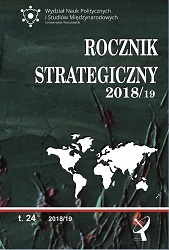

In the last dozen months we have seen a spectacular comeback of power politicsin international relations. It is partially caused by a crisis of democracy and of theinternational liberal order as well as by an increase of unilateralism in the policy ofbig states. At the same time, we note a peculiar pandemic of a petty tyrant type ofpoliticians who are power hungry and ready to change the political system of theircountry in order to extend their rule indefinitely. The trend has been accompanied bya dramatic decrease of moral standards in international politics. The trend of powerpolitics has been dictated by the US administration and enthusiastically followedby Russia and China, which feel in their natural element in it. The same has beennoted in the policy of a number of mid-size powers. The Middle East seems tobe a regional laboratory of this tendency, with the dangerous example of Saudi--Iranian confrontation. The new global political context means the risk of furthermarginalization of the European Union. Additionally, internal problems made theUnion even weaker. Macron’s and Merkel’s position has been put into question andturbulent Brexit damaged the energy and image of both the UK and the Community.Poland’s policy, marked by the rise of centrifugal nationalistic political forces, looksmore like part of the problem than the solution of the troubling European situation.
More...
In 2018, the world’s arms control architecture teetered on the brink of collapse.The paper presents some examples of this process: 1. the United States withdrewfrom the Iran nuclear deal (P5 + 1 – Iran); 2. the summit in Singapore was important,but negotiations between the United States and North Korea over Pyongyang’snuclear programme and denuclearization of the Korean Peninsula stalled; 3. the newSTART was correctly implemented but its future is uncertain; 4. the US threatenedto withdraw from the INF.
More...
The paper presents an overview of the changes in the global economy since 2017.Consecutive sections deal with the analysis of economic indicators and challengesfaced by Global Economic Governance in its particular dimensions: trade, finance,and development. In spite of a moderately positive condition of the global economyin the last two years, the current situation cannot be considered as fully stable. Thisapplies both to economic output and the future of the global economic order. Inevery dimension of Global Economic Governance, there is a significant rift betweenthe efforts to promote multilateral solutions and individual actions taken by somestates. In case of the global trade system, the major concern constitute the risingprotectionism and the threat of trade conflicts, as well as the growing dysfunctionof the World Trade Organization (WTO). The recurring issue for global financialsystem remains its reform. In terms of global development cooperation, progresshas been made towards eliminating poverty, yet simultaneously income inequalitiesare on the rise. Moreover, in spite of the ongoing reform of development finance,the current system is incapable of meeting the needs of sustainable development andinclusive growth.
More...
The aim of this article is to analyze international relations in the Asia-Pacific regionfrom the historical perspective of the 40th anniversary of the economic reformin China and the establishment of diplomatic US-China relations. China’s successfulreform programme and US-China economic cooperation have helped to transformthis country into a superpower and, as a result, multilateralism in the region hasbeen replaced by new US-China bipolar structure. 2018 was the year regional actorsgrew accustomed to this new strategic environment.
More...